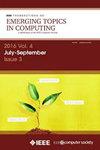MFDS-STGCN:利用细粒度时空活动数据预测大学生行为
IF 5.1
2区 计算机科学
Q1 COMPUTER SCIENCE, INFORMATION SYSTEMS
IEEE Transactions on Emerging Topics in Computing
Pub Date : 2024-01-01
DOI:10.1109/TETC.2023.3344131
引用次数: 0
摘要
从细粒度的时空校园活动数据中挖掘和预测大学生行为对大学生的学业成功和个人发展起着关键作用。现有的行为预测方法大多使用统计、聚类和相关分析等浅层学习算法,无法从这些细粒度校园数据中挖掘长期的时空依赖关系和语义相关性。我们在时空图卷积网络(STGCN)的基础上,提出了一种新型的多片段动态语义时空图卷积网络,并将其命名为 MFDS-STGCN,用于大学生行为和异常行为的自动预测。我们构建了一个数据集,其中包括约 400 名学生在 140 天内的 760 万条行为记录,以评估预测模型的有效性。广泛的实验结果表明,在学生行为预测和异常行为预测方面,所提出的方法优于多种基准预测方法,准确率分别为 92.60% 和 90.84%。为了进一步实现行为预测,我们建立了预警管理机制。基于大数据的预测和分析,教育管理者可以及时发现学生的不良异常行为,从而实施有效干预,更好地引导学生的校园生活,最终帮助学生更有效地发展和成长。本文章由计算机程序翻译,如有差异,请以英文原文为准。
MFDS-STGCN: Predicting the Behaviors of College Students With Fine-Grained Spatial-Temporal Activities Data
Mining and predicting college students behaviors from fine-grained spatial-temporal campus activity data play key roles in the academic success and personal development of college students. Most of the existing behavior prediction methods use shallow learning algorithms such as statistics, clustering, and correlation analysis approaches, which fail to mine the long-term spatial-temporal dependencies and semantic correlations from these fine-grained campus data. We propose a novel multi-fragment dynamic semantic spatial-temporal graph convolution network, named the MFDS-STGCN, on the basis of a spatial-temporal graph convolutional network (STGCN) for the automatic prediction of college students’ behaviors and abnormal behaviors. We construct a dataset including 7.6 million behavioral records derived from approximately 400 students over 140 days to evaluate the effectiveness of the prediction model. Extensive experimental results demonstrate that the proposed method outperforms multiple baseline prediction methods in terms of student behavior prediction and abnormal behavior prediction, with accuracies of 92.60% and 90.84%, respectively. To further enable behavior prediction, we establish an early warning management mechanism. Based on the predictions and analyses of Big Data, education administrators can detect undesirable abnormal behaviors in time and thus implement effective interventions to better guide students' campus lives, ultimately helping them to more effectively develop and grow.
求助全文
通过发布文献求助,成功后即可免费获取论文全文。
去求助
来源期刊

IEEE Transactions on Emerging Topics in Computing
Computer Science-Computer Science (miscellaneous)
CiteScore
12.10
自引率
5.10%
发文量
113
期刊介绍:
IEEE Transactions on Emerging Topics in Computing publishes papers on emerging aspects of computer science, computing technology, and computing applications not currently covered by other IEEE Computer Society Transactions. Some examples of emerging topics in computing include: IT for Green, Synthetic and organic computing structures and systems, Advanced analytics, Social/occupational computing, Location-based/client computer systems, Morphic computer design, Electronic game systems, & Health-care IT.
 求助内容:
求助内容: 应助结果提醒方式:
应助结果提醒方式:


